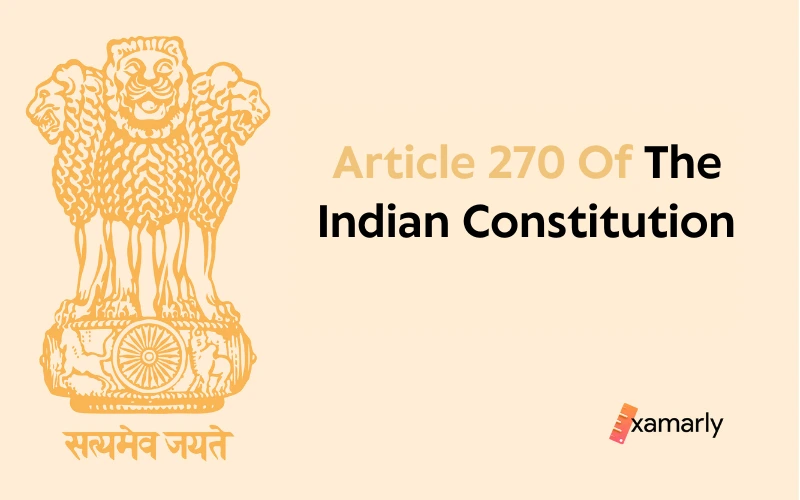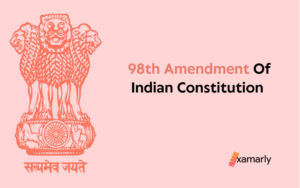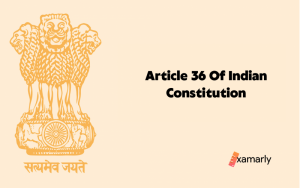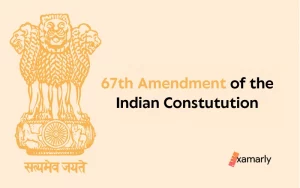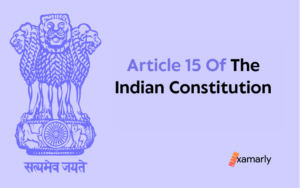In accordance with a predetermined formula that is established by the Finance Commission once every five years, Article 270 of the Indian Constitution deals with taxes that are imposed and collected by the central government as well as how they are allocated between the central government and state governments.
According to the 14th Finance Commission and unchanged by the 15th Finance Commission, the state’s portion of the net receipts of Union tax revenue for the operational period of 2015–2020 was 42%.
What Is Article 270 Of The Indian Constitution?
The constitutional provisions of Article 270 are outlined in the following three clauses and sub-clauses as well:
- All taxes and duties referred to in the Union List, with the exception of the duties and taxes referred to in Articles 268, 269, and 269A, respectively, as well as any surcharge on taxes and duties mentioned in article 271 and any cess charged for specified objectives under any law adopted by Parliament, shall be levied and collected by the Government of India and allocated between the Union and the States in the manner stipulated in clause (2).
- (1A) The tax collected by the Union pursuant to clause (1) of article 246A shall also be
allocated between the Union and the States in the manner determined in clause (2). - (1B) The tax imposed and collected by the Union under clause (2) of articles 246A and 269A, which was used to pay the tax imposed by the Union under clause (1) of articles 246A, and the amount allotted to the Union under clause (1) of articles 269A, shall also be distributed between the Union and the States in the manner specified in clause (2).
- (1A) The tax collected by the Union pursuant to clause (1) of article 246A shall also be
- The net earnings of any such tax or duty in any financial year, in the percentage that may be prescribed, shall not be deposited in the Consolidated Fund of India but shall be allotted to the States within which the tax or duty is imposed in that year, and shall be dispersed among those States in the manner and from the period as may be prescribed in clause (3).
- “Prescribed” in this article refers to:
- (i) until a Finance Commission has been established, as ordered by the President, and
- (ii) Following the formation of a Finance Commission, by order of the President following
consideration of the recommendations of the Finance Commission.
Relatable Articles:
Conclusion
India is a sizable nation with a diverse population of socioeconomic backgrounds. Everyone cannot pay the same amount in taxes. This is one of the factors that has made India’s tax system so challenging for so long.
Since the introduction of the GST, an all-inclusive indirect tax that has contributed to
removing the prior cascading impact, the process has become more streamlined.
In conclusion, the Indian Constitution gives the Parliament unbounded privileges and a wide range of authority that is neither stringent nor consistent. Therefore, there are clauses that allow the legislation to be changed in response to emerging needs.
FAQs
What Exactly Do You Mean By Excise Duty?
Excise duty is a sort of tax imposed on products during the production, distribution,
and sale of such products. Excise duty is an indirect tax that producers of goods pay to the Indian government. It is the exact opposite of customs duty in that it only applies to things made locally in India, whereas customs only affects things brought into the nation from elsewhere.
What Is The Article 270 Of The Constitution Of India?
Taxes imposed and collected by the Union and divided between the Union and the States are the subject of Article 270. It permits the cess to be exempted from the Union government’s obligation to share with the States a portion of the divisible pool of taxes.
What Do You Understand By Article 268?
Article 268 of the Indian Constitution describes duties imposed by the Union but collected and appropriated by the State of India.
What Is Article 269 Of The Constitution Of India?
Article 269 of the Indian Constitution discusses taxes that are imposed and collected by the Union but given to the State.
What Is Article 269A Of The Constitution Of India?
Article 269A of the Indian Constitution governs the assessment and collection of the goods and services tax throughout interstate trade or commerce.
What Is Article 246A Of The Constitution Of India?
Article 246A of the Indian Constitution covers the subject matter of laws passed by both the Parliament and the State Legislatures.


